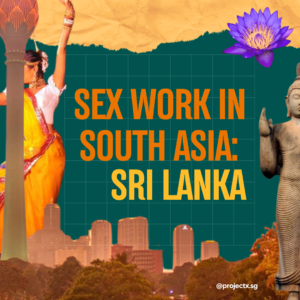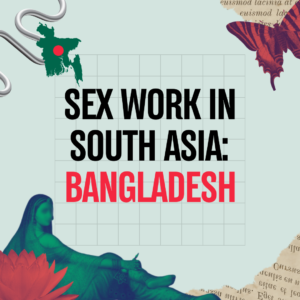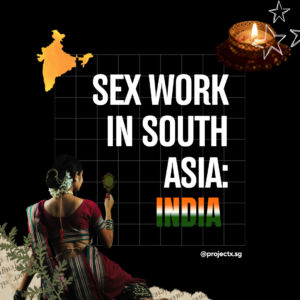Preface
This is the fifth post in Project X’s new series ‘Sex work in ASEAN nations’ – a series designed to encourage greater understanding of, and dispel common myths about, sex work in the region. This series will consider the state of the sex industry and sex workers rights in each of the 10 ASEAN countries. It will consider the unique historical, cultural, political and economic circumstances of that country, as well as why the decriminalisation of the industry is crucial for the region’s economic and political development.
A Brief History of Sex Work in Singapore
Since the late 19th and early 20th centuries, foreign women were already being brought into Singapore to meet with the rising demand of sex and women due to the influx of work sojourners in Singapore. For instance, in 1884, there were 60,000 Chinese men but only 6,600 Chinese women. These women could come from Malaysia, China, and Japan, amongst many other countries, and it was actually not cheap to engage these workers – a Chinese sex worker could cost up to $500, which was a lot considering the average monthly salary was only $10 to $15. According to The National Heritage Board (NHB) Singapore, the workers were terribly mistreated, “Once in a brothel, the girls were often subjected to beatings, and received little or no medical attention. Riddled with diseases, these pitiful women were often also murder victims. Seeing no other escape from their living hell, a number of these prostitutes took their own lives. While some threw themselves off buildings, others preferred a more subtle method – an opium overdose.”
During this period, sex work was deemed as the “necessary evil” by the British. However, by 1932, the British began criminalising activities surrounding sex work in some of their colonies. During the Japanese Occupation between 1942 to 1945, women served as ‘comfort women’ for the Japanese soldiers, many of whom were forcibly taken by the soldiers for such sexual enslavement, while some others were deceived into it.
When the People’s Action Party (PAP) came into power in the late 1950s, sex work was initially completely banned, but thereafter regulated the industry through medical surveillance following a shift to a strategy of containment instead in the 1960s. In fact, Singapore bifurcates between quasi-regulation and criminalisation today.
Law, Policy, and Policing
In Singapore, sex work is legal, but many activities surrounding it are criminalised. The 1961 Women’s Charter criminalises activities related to sex work, such as living off the earnings of sex work, owning and managing brothels, soliciting for customers in public, trafficking women to provide sexual services, and syndicates that facilitate sexual services (both online and offline). These offences are punishable by fines, imprisonment, and/or caning. Since 2012, there has been increase in the number of police raids on brothels.
Singapore’s management of the sex work industry is particularly interesting, as it is operating through an extra-legal framework (a regulatory framework that does not have any official legal sanction). Regulated sex work is confined geographically to designated red-light districts – Geylang, Flanders Square, Keong Saik Street, and Desker Road.
Sex Worker Statistics and their Economic Impact
As of 2021, there are an estimated 10,000 sex workers in Singapore, with less than 1,000 of them being registered under the government. Despite the option of being registered, more workers have shifted to online, street-based, massage parlours-based, and entertainment venue-based sex work. According to an article from The Straits Times in 2014, the average age of a street-based sex worker is 26 years old, serves around four customers a day, and earns about S$3,200 per month. However, other types of sex work can fetch higher prices, with some higher-end escorts charging up to S$2,000 per hour. There are more than 100 registered brothels operating in Geylang, in which a brothel would cost at least S$1 million to set up. Nationality is used to categorise the workers into different brothels.
To be a registered sex worker in Singapore under the Yellow Card System, one must be from China, Vietnam, Thailand, Malaysia, or Singapore. Sex workers must be between age 21 to 35, and are mandated to work six to seven days a week, with no allowance for medical leave. The workers live restrictive lifestyles – their passports and contracts withheld by the police, needing to seek permission to leave the brothels (else they might face a fine of up to SGD$500), and being deported and banned from Singapore for up to a lifetime.
With the rising popularity of platforms like OnlyFans and due to the lockdown restrictions during the COVID-19 pandemic, many workers have pivoted to carrying out online sex work. Those who did not, found it hard to get by with the lack of patronage. Met with food and housing insecurity, sex workers will also be more susceptible to HIV and other STIs, including sexual abuse. In the post-COVID world, Singapore might also have to anticipate a greater immigration of sex workers because of the worldwide economic downturn which could force people to resort to sex work for their livelihood.
It is also important to note that, despite the dominant narrative that sex workers are forced or trafficked into sex work, only five sex trafficking cases have been prosecuted to date. That said, reducing all sex workers to being victims of human trafficking diminishes their agency and consent.
Culture, Religion, and Social Norms
As with many Asian societies, sex work is socially and politically stigmatised in Singapore, which creates many misconceptions about the industry – “Many people have this dual image of sex workers where on the one hand, they are seen as money-grabbing, gold-digging nymphomaniacs, while on the other hand, they must be victims of abuse, human trafficking or coercion.”The reality, however, is much more complicated. Sex work is often viewed as undesirable, even though workers themselves do not see it that way.
The deep-rooted taboo surrounding sex work in Singapore can be traced back to the colonial history of the country under the British administration. The PAP’s rise to power after Singapore’s independence was also accompanied by a campaign for the eradication of “yellow culture” (i.e. vice) in Singapore. Even though the policies for vice eradication were reversed in the end, Singapore has eventually racked up the international reputation of being conservative. The topic of sex itself remains a taboo, which makes it hard for a healthy, public discussion about sex work to exist, by extension. Additionally, male sex workers will experience double stigmatisation – the stigma against sex work and the stigma against homosexuality.
Efforts to reach out to sex workers to support and understand their needs are limited and might be met with distrust too. The social stigma, the restrictive laws around sex work, coupled with unpleasant experience with the law enforcement, isolate sex workers from institutional and social protection. Workers would face abuse from the law enforcement, constant raids, and entrapment, which further alienate them from institutional support. Due to the grey area that sex work exists in, abuse experienced by workers would go unreported as they fear persecution.
The Hope for Law Reform
There have been attempts by law enforcement agencies to minimise any possible exploitation and abuse of sex workers through implementing harsher penalties on pimps and illegal brothel owners. For instance, a first time offender could be imprisoned for up to seven years and face a fine up to S$100,000, which is a 10-fold increase from the previous sentencing. Even though they recognise there is exploitation of sex workers, the law does not provide institutional protections for them.
It is fortunate that the Singapore government recognises the inevitable existence and necessity of sex work as an industry. In 1999, during a parliamentary exchange with former opposition Member-of-Parliament (MP) J.B. Jeyaretnam, then Home Affairs Minister Wong Kan Seng acknowledged that “Criminalising prostitution will only drive such activities underground, resulting in crime syndicates taking control over such activities”. There have been call for actions at the grassroot level, advocating for greater awareness and better rights for sex workers – “Both government agencies and civil society organisations in Singapore should work together to help empower sex workers and raise awareness about the many issues they confront, ranging from verbal abuse to discrimination to physical violence,” according to Dr Kevin McGahan, a political science lecturer at the National University of Singapore.
In 2016, under the amended Massage Establishment Act (MEA), unlicensed massage operators could face a fine of $10,000 and/or face imprisonment for two years. In a Channel News Asia (CNA) article, Vanessa Ho, the Executive Director of Project X, observed an uptick in the number of targeted raids on massage parlours since the amendment. While harsher fines and punishments may be intended to eradicate future offences, Ho pointed out that there will be a perennial demand to replace the sex workers arrested in such raids, only further benefiting the pimps and clients, to the disadvantage of sex workers. Displacements from massage parlours can make sex workers increasingly susceptible to abuse and violence.
MPs have also spoken up to call for reviews of laws and regulations surrounding sex work. In 2019, MPs Louis Ng, Alex Yam, Melvin Yong, Darryl David and NMP Anthea Ong and Kok Heng Luen had a parliamentary debate about the industry and even challenged the effectiveness of enforcement strategies by the police towards sex workers. However, these recommendations need to translate to more concrete actions through gaining sufficient popular support, for sex workers to be truly taken care of and be treated with dignity.
Where politics cannot gain much ground, Project X in Singapore has made significant progress in its efforts to make sex work a safer industry and to promote the rights of sex workers. From healthcare and legal aid, to advocacy and support, Project X is paving the way for improvements in the industry.
Reference List
Asokan, A. (2019, October 11). Sex work in Singapore: Will changes to the women’s charter be enough to tackle exploitation? CNA. https://www.channelnewsasia.com/singapore/prostitution-sex-work-trafficking-womens-charter-bill-singapore-856301
Blackburn, K. P. (2022). Comfort women of singapore in history and memory. NUS Press.
Chapman-Schmidt, B. (2015). Sex in the shadow of the law: Regulating sex work and human trafficking in Singapore. Asian Journal of Comparative Law, 10(1), 1–21. https://doi.org/10.1017/asjcl.2015.1
Chua, J. Y. (2019). The strange career of gross indecency: Race, sex, and law in Colonial Singapore. Law and History Review, 38(4), 699–735. https://doi.org/10.1017/s073824801900052x
Chua, L. J., & Radics, G. B. (2021). Stigmatisation, identities and the law: Asian and comparative perspectives. International Journal of Law in Context, 17(3), 281–283. https://doi.org/10.1017/s1744552321000380
Descalsota, M. (2022, May 11). Brothels and sex workers once thrived in Singapore’s red-light district. but the pandemic has turned it into a sleepy enclave that’s yet to be resurrected. Insider. https://www.insider.com/red-light-district-singapore-geylang-brothels-prostitution-tour-photos-2022-5
Foo, A. (2021, January 21). When women were commodities. BiblioAsia. https://biblioasia.nlb.gov.sg/vol-15/issue-4/jan-mar-2020/women-w-commodities/
The Independent. (2014, March 6). History: The brothels of Colonial Singapore . The Independent. https://theindependent.sg/history-the-brothels-of-colonial-singapore/
Kathleen. (2018, December 19). Project X highlights the depressing reality of sex workers in Singapore who face abuse on all fronts. The Online Citizen Asia. https://www.theonlinecitizen.com/2018/12/19/project-x-highlights-the-depressing-reality-of-sex-workers-in-singapore-who-face-abuse-on-all-fronts/
Keenan, J. (2013, July 16). I talked about sex with Singaporeans – their reaction surprised me. The Atlantic. https://www.theatlantic.com/international/archive/2013/07/i-talked-about-sex-with-singaporeans-their-reaction-surprised-me/277862/
Khong, H. L., & S., J. K. (2010). Labour market segmentation in Malaysian services. NUS Press.
Laws on procuring sex workers & sexual services in Singapore. SingaporeLegalAdvice.com. (2021, June 25). https://singaporelegaladvice.com/law-articles/laws-procuring-sex-workers-sexual-services-singapore/
Martin, M. (2018, May 18). 5 things Singaporeans want to know about sex – but are afraid to ask. CNA Lifestyle. https://cnalifestyle.channelnewsasia.com/wellness/singaporeans-sex-common-questions-spark-fest-asia-257841
Ong, J. (2018, August 15). A ‘cat and mouse game’: Unlicensed massage parlours feel the heat from new laws. Retrieved August 25, 2023, from https://www.channelnewsasia.com/singapore/unlicensed-massage-parlours-establishments-act-illegal-vice-803456
Ong, J. (2017, June 9). The “demand and Supply” fuelling Singapore’s premium foreign sex industry. CNA. https://www.channelnewsasia.com/singapore/demand-and-supply-fuelling-singapores-premium-foreign-sex-industry-1011131
Project X. (n.d.). Project X. https://theprojectx.org/#:~:text=According%20to%20a%20study%20conducted,them%20are%20migrant%20sex%20workers
Sun, X. (2019, November 4). Second reading of the women’s charter (amendment) bill 2019 – wrap-up speech by Ms Sun Xueling, senior parliamentary secretary, Ministry of Home Affairs and Ministry of National Development. Ministry of Home Affairs. https://www.mha.gov.sg/mediaroom/parliamentary/second-reading-of-the-women-s-charter-amendment-bill-2019—wrap-up-speech-by-ms-sun-xueling-senior-parliamentary-secretary-ministry-of-home-affairs-and-ministry-of-national-development/
Tai, J., & Toh, Y. C. (2016, January 19). Shedding light on freelance prostitutes in Geylang. The Straits Times. https://www.straitstimes.com/singapore/shedding-light-on-freelance-prostitutes-in-geylang
Tan, R. K., Ho, V., Sherqueshaa, S., Dee, W., Lim, J. M., Lo, J. J.-M., Teo, A. K., O’Hara, C. A., Ong, C., Ching, A. H., West, B. S., & Wong, M. L. (2021). Covid-19 and the Shifting Organisation of Sex Work Markets in Singapore. Culture, Health & Sexuality, 24(12), 1744–1759. https://doi.org/10.1080/13691058.2021.2014975
Wei, C. S. (2021, March 30). Project X’s Vanessa Ho is demystifying The plight of sex workers in Singapore. Here’s how. Tatler Asia. https://www.tatlerasia.com/gen-t/leadership/project-xs-vanessa-ho-is-demystifying-the-plight-of-sex-workers-in-singapore-heres-how
Wellesley Centers for Women. (1996). Singapore Women’s Charter . https://www.wcwonline.org/pdf/lawcompilation/Singapore-women’s%20charter.pdf






